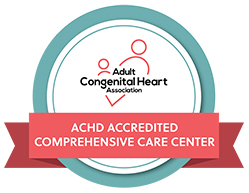
Popular Locations
- Yale New Haven Children's Hospital
- Yale New Haven Hospital - York Street Campus
- Yale New Haven Hospital - Saint Raphael Campus


The Yale Adult Congenital Heart Program, part of the Heart and Vascular Center, is the first integrated program in Connecticut dedicated to the care of adult patients with complex congenital heart disease.
This multidisciplinary program encompasses the full spectrum of care and provides continuity for adults living with congenital heart disease. The Yale Adult Congenital Heart Program is accredited by the Adult Congenital Heart Association and provides regular inpatient and outpatient services to the most complex adult congenital heart patients, offering a full spectrum of imaging, exercise testing and surgical and less-invasive catheterization therapies.
Our expert care team of Yale Medicine physicians includes cardiologists board-certified in pediatric and adult cardiology; pediatric cardiologists; adult cardiologists; and pulmonologists. The team also includes an advanced practice nurse, genetic counselors and a social worker.
Working with our colleagues in adult medicine, patients 18 years and older who were diagnosed and treated as children, as well as adults diagnosed with heart defects for the first time, receive detailed education about their underlying congenital heart defect, its management, and the implications on future functioning.
Patients have access to advanced diagnostic imaging, including echocardiography and MRI.
The adult congenital heart team collaborates with specialists in high-risk obstetrics and maternal fetal medicine, cardiac imaging, cardiac transplantation, cardiothoracic surgery, interventional cardiology and sub-specialists in related areas, including kidney disease.
We care for a broad range of health concerns, but commonly encountered problems in ACHD patients include:
Many patients wait to treat their congenital heart disease. Imaging, including echocardiograms (ultrasound) and MRI, allow us to diagnose problems before they limit your ability to live and work symptom-free.
Our ACHD team is involved at every step along the way and includes experts in congenital electrophysiology who offer potential curative therapies for life-threatening arrhythmias; interventional cardiologists who perform cardiac catheterizations for patients with congenital heart disease; and a team of pediatric and adult cardiovascular surgeons with experience spanning three decades.
Ours is the only program in the state offering minimally invasive cardiac catheterization for premature infants. The team of interventional cardiologists also performs closures of atrial septal defect, patent foramen ovale (PFO) and patent ductus arteriosus; as well as nonsurgical transcatheter treatment of aortic and pulmonary valve stenosis, coarctation of the aorta and intravascular stent placement for narrowed arteries and vessels, and blood vessel coil occlusion.
Conditions we treat include: